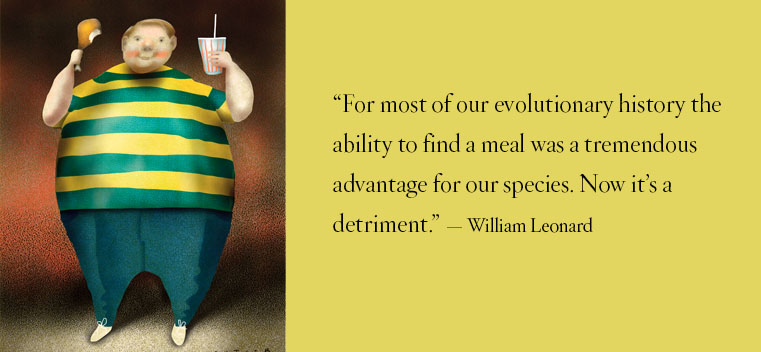
The Evolution of Diet
Tell us what you think. E-mail comments or questions to the editors at letters@northwestern.edu.
Ever wonder about those strange designations we use throughout Northwestern to identify alumni of the various schools of the University? See the complete list.
Find Us on Social Media
Hunter-gatherer societies offer a model for modern human nutrition.
To support the metabolic demands of our large, energy-consuming brains, early humans evolved to become expert meal finders, gathering plant foods and ranging over dozens of miles a day to hunt wild game. But our evolved efficiency at finding food now comes at a cost to our health.
“For most of our evolutionary history the ability to find a meal was a tremendous advantage for our species,” says William Leonard, Abraham Harris Professor of Anthropology and chair of the department. “Now it’s a detriment. We’re too efficient at producing very large returns of energy with very little cost in terms of energy expenditure, and that’s the key explanation for the bind we’re in with obesity in this country and around the world.”
Leonard, a biological anthropologist, studies some of the few remaining traditional, hunter-gatherer, subsistence food production societies in South America and Siberia and explores how the transition to a modern lifestyle has created energy imbalances that play a major role in obesity today. His research on evolution and human nutrition was presented at the American Association for the Advancement of Science annual meeting in February.
When populations from traditional societies make the transition into the market economy, Leonard says, “the first things to be incorporated into the diet are things that we now see are bad for us. Why is that? Because those are the very things that we crave — sweet things, fatty things — things that in our evolutionary past were so limited that now they taste good to us.”
Leonard, an affiliated faculty member at the Northwestern Comprehensive Center on Obesity, is studying people from 13 communities in the jungles of Bolivia who are making the transition from a traditional society to a more modern way of life, longitudinally tracking how those changes play out in terms of health. His research in Siberia looks at similar issues, with the backdrop of the major political and economic changes that have occurred in Russia over the past 20-plus years. When the Soviet infrastructure for food and resource delivery collapsed, malnutrition, especially among children, increased. Now he’s observed rising obesity rates as satellite TVs and Western food products make their way into tiny Siberian villages.
Throughout his career Leonard has admired “the remarkable and clever ways” humans process their foods to make them more palatable and safe to eat. In the Andes, for example, he’s eaten chuño, dehydrated small potatoes that can be stored indefinitely. “It’s like Styrofoam but not bad when you get used to it,” he says. In the Arctic Leonard has eaten “Siberian sushi,” raw fish that’s been salted heavily and let stand for weeks. “The eventual product has all the qualities of fish that you always are told you should not eat: It’s gummy. It’s icky. It’s a little aromatic.” He’s also had South American chicha, a fermented beverage created from the cassava plant. To start the fermentation, the indigenous people chew the starchy root plant, creating in the end “spit beer.”
“It’s an acquired taste,” Leonard says.
Those tasty treats taught him that “there is a remarkable variety of ways to meet our nutritional needs in wildly different environments.” Those experiences have also convinced him that balance is the best approach to a healthy lifestyle. “Some people are advocating the paleo diet, the caveman diet,” Leonard says. “It’s a fairly narrow prescription for what you should be allowed to eat, implying that this is somehow the perfect evolutionarily designed diet for humans. I think that’s bunk.
“If the human experience and evolution tell us anything, it’s that humans have developed a remarkable diversity of strategies for meeting our nutritional needs. In terms of becoming healthier, that should be an encouraging message. It means that people shouldn’t think of nutrition as finding the magic diet. Rather healthy nutrition is all about finding something that is going to be sustainable for you over the long haul, finding something that is going to be a mixture of foods, largely based on whole foods, where you’re getting a significant amount of plant material, fruits and vegetables, and most likely some animal protein.”
Leonard says the traditional societies also show the importance of movement. They “do work harder than we do in terms of daily energy expenditure,” he says, “but those high levels are achieved by relatively modest increases in activity over large portions of the day. It’s a slow and steady approach to being more active, which fits nicely in terms of a message of becoming healthier.”



 Facebook
Facebook Twitter
Twitter Email
Email


